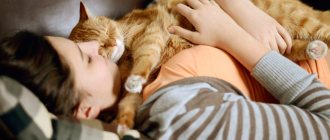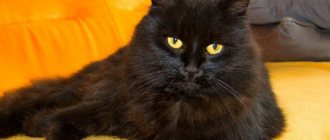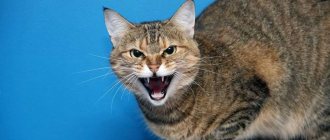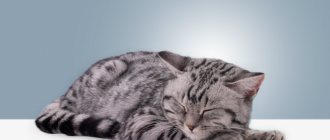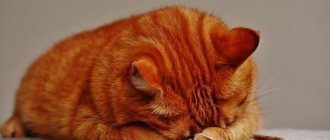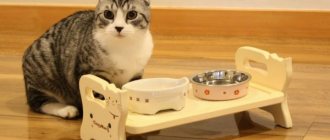If a cat sleeps on its owner’s bed, what is the sign if it sleeps at the feet or above the head? Many cat owners would be interested to know about this. Some say that the animal is simply looking for a warm and comfortable place to sleep, and some say that the cat is capable of taking away negative energy from the owner and therefore lies down exactly where the source of the disease is located.
If a cat sleeps at the head of the owner, what does this mean?
Experts have conducted a number of studies and found that a cat can sleep near its owner's head for several reasons.
According to physiological
The human head is always warm, and therefore the animal is very comfortable there. The location of the cat near another part of the body may indicate that it is hot there and perhaps there is an inflammatory process leading to this. The cat will experience the same comfort when lying on a battery or on a laptop.
In a dream, a person does not swing his head, but a cat has most likely already gotten his foot or hand accidentally, so the animal could remember that he can sleep peacefully near his owner’s head.
Emotionally
An emotional connection between the owner and the cat can occur if they are very attached to each other. Then the location of the cat in the area of the owner’s head indicates that she adores him.
According to energy
As for human energy, a cat is able to detect the slightest fluctuation. It is for this reason that it will settle down in the place where the most negativity has accumulated. The animal will take on the entire burden of problems (although no - only part of the load, which the cat must then process and then return again for the rest of the negativity).
According to popular belief, the place where the cat lies down is not just that. If the place is always the same, this signals the development of pathology in the area where the cat is located. Constantly settling above the head is a signal of the owner’s chronic fatigue, increased nervousness, frequent headaches and disruptions in cerebral circulation.
Blanket as a maternity hospital and a hospital
It is the place under the blanket that pregnant cats often choose as a “nest”. If the due date is already close, and the cat meows and hides under the blanket, this is a sure sign that the babies will be born in the very near future.
Don't want your pet to lamb right in your bed? Then prepare a cozy place for her in advance: a box, drawer, basket, covered with something soft. It’s good to put something there that retains the owner’s scent - for example, an old T-shirt.
The owner's bed is almost the first place where a cat hides a kitten in case of danger. Why does she feel safer under the covers than anywhere else? The tailed mother trusts her owner with the most precious thing she has, being confident that the person who has always protected her will also protect her offspring, no matter what happens.
Sick cats also seek protection from pain under the blanket. If your pet, who has not previously been noticed to be overly fond of the master bedroom, suddenly starts going there often, take a closer look at your pet, perhaps she needs to be shown to the veterinarian.
If the animal has become aggressive or, on the contrary, lethargic and indifferent, there is discharge from the nose or eyes, vomiting, or stool changes - this means that the pet is sick and is waiting for help from you.
The reason for the cat's location in the owner's head can be aromatic and territorial
Aroma
Oddly enough, cats have their own scent preferences. And if the pet likes the smell of the owner’s new shampoo, he will, without hesitation, lie down right next to her head to enjoy the smell he likes all night long.
Territory
The cat's nature requires that in the house where he lives, everything should be marked with him - so that everyone knows “who is boss.” For this reason, the cat may constantly rub itself next to its owner so that its scent can be found everywhere it can. That is why, and not out of harm, as some housewives believe, the cat needs to lie on things in the closet, and preferably on all the shelves. Therefore, the linen closet must have a reliable latch against a furry pet.
Experts say that a cat’s preference for sleeping at the owner’s head should be a signal that it would not hurt to undergo a medical examination. After all, a cat can sense trouble at its very beginning. And if the diagnosis is made on time and treatment is started on time, everything can end quite well.
The cat will climb onto the owner’s chest if it senses his tension or bad mood. The pet will try to calm you down and convey its positive mood.
Why does a cat take the owner's place?
If a cat lives in the house, then its owner cannot help but notice some peculiarities in the behavior of his animal. Cats and cats can surprise; they give rise to a lot of questions and superstitions. If a person is about to sit down on a chair, then the cat is right there. The pet jumps onto the chair right in front of the owner's nose.
It seems that the pet is doing this on purpose, as if he wants to demonstrate his leadership and audacity. The owner at this moment usually adjusts and does not interfere. However, the situation is somewhat different. The cat tries to take exactly the place of the owner, since the elusive smell of a person remains there. Cats have a keen sense of smell.
The pet expresses the mood to be close to its owner. The same thing happens when a cat goes to sleep on its owner's clothes.
After the owner gets up from the chair, the seat retains heat for some time. A soft, warm chair that also retains its owner's scent is a great place to sleep. If a feline jumps onto a chair before the owner sits down, this is a sign that the pet is attracting attention. You need to try to give the animal some of your time, communicate, scratch the cat behind the ear.
If a cat sleeps on the owner's bed at his feet, it is a sign
A folk superstition says that cats sleep at their feet if they believe that their owners’ aura needs cleaning. During the day, the owner could break a lot of wood, thereby spoiling his aura. And it’s up to the pussy to take the rap, and she knows how to save him.
Esotericists claim that all the negativity that comes to a person during the day is concentrated below, which is why most often cats sleep not just anywhere, but precisely at the feet of a person, healing their owner.
There is another opinion on this matter - supposedly purrs see (feel) areas on the human body that need urgent treatment. Thus, problems in the lower extremities cause the cat to sleep there.
Most often, a furry pet is diagnosed with a disease associated with varicose veins in this way. Although simply being tired during the day can lead to a similar state, and the cat will lie down at the feet of its owner for the night.
Signs of a cat's rest
Recently, more and more different signs about representatives of the feline family in the bed of their owner have been popping up on the Internet. Until now, experts continue to argue about why pets do this, but there are several plausible assumptions:
- Pets are designed in such a way that they have very strong energy, so they can easily find pain points on the human body and begin to heal them. If the owner has a headache, then for this reason the animal can lie down in the area of the head and try to “cure it.”
- an independent cat who has chosen a certain person as her owner believes that this person is a stronghold of security for her, so she lies down on his pillow or head and finds a calm place;
- if a pet sleeps in its owner’s bed, it shows its love and devotion;
- cats are extremely heat-loving animals; they are constantly looking for a warm place in the house. One of the sources of heat is a person, so it is logical that a pet is looking for a place near its owner.
If a cat sleeps on the owner's bed, whether this is a sign, everyone decides for themselves
There are people who believe in omens, and there are others - ultimately, this is a matter for the owner. Optimists recommend believing only in good omens and not paying attention to others. It may very well be that they are right. After all, suggestion, like self-hypnosis, is a huge power, and therefore it is better to convince yourself that everything in life happens for the better.
The ancient Slavs believed that if you allow a cat to sleep in the same bed with you, then the owners will definitely have frogs in their heads. Nowadays such a statement is unlikely to scare anyone, but before they believed it and drove the fluffies away.
There is a category of people who do not allow cats to sleep with them in bed due to hygiene requirements. But you can monitor the health and cleanliness of the animal as if it were your own. Experts warn about only one thing: those pets that walk outside will always be potentially dangerous.
Cats should not be allowed to sleep with small children either - they may develop an allergy to these animals due to too close contact.
Reasons why a cat hides
Fear and stressful situations
Stress can be temporary or permanent. The cause of temporary fear is renovations in the house, the arrival of guests, the appearance of a newborn baby or another pet, moving to a new place or staying in a pet hotel. Sometimes fear is caused by the bizarre shape of a houseplant or a soft toy. A cat that is accustomed to a measured life or peace tries to hide from the source of fear, not to go where things incomprehensible to it are happening. Often hisses and growls. However, after eliminating the stress, the pet boldly leaves the darkened place and behaves normally.
An animal can behave this way when its owners are constantly quarreling.
If a cat hides in dark places, this indicates a long-term internal conflict due to a stressful situation.
The predisposing factors for such behavior are constant conflicts between family members, aggressive attitude of children towards the animal, and total inattention to the pet. The cat appears calm, but is stressed
This is noticeable if obsessive movements, tics, and constant licking of certain places on the body appear until bald spots form. The animal hides in the closet, under the bed and does not want to come out because it is afraid of its owners.
Shyness
Even if the owner loves the pet very much, the animal may be shy. Delicate and friendly animals are especially prone to this. They try to hide in the closet if they accidentally do something dirty - turn over a pot with a plant, tear a toy, drop a vase. When a cat hides in a dark place, she feels guilty
Therefore, the owner should pay attention to his pet. A cat may also be shy at first when brought home from a shelter or picked up on the street.
Hide and seek
Often a cat hides under a blanket, in closets, bedside tables during the cold season. When a cat is cold, he prefers a dark place among clothes, in which he burrows, warms himself and sleeps. In addition, cats love small spaces that warm them with body heat. Also, pets cannot tolerate bright light, so in hot weather they go into a darker corner.
An animal can hide in a place from where it is very convenient to keep an eye on its “prey.”
It should be remembered that the domestic cat has inherited the instinct of its wild ancestors, so it often hides in a dark place while hunting. While playing, a kitten and an adult cat hide, considering themselves invisible, carefully watching their movements and attacking their owner. This is exactly how hidden predators behave in nature and track their prey.
Pregnant cat
Before giving birth, the pet herself finds a dark place where she is safe. The owner should not kick the cat out of there if the place does not pose a danger, otherwise the animal may feel uncomfortable and experience additional stress in another place chosen by the person. This is where the cat hides her newborn kittens. If the pet has chosen an inappropriate place, the owner can do something similar and put it in a secluded corner.
The house is very hectic and noisy
There are times when a pet begins to behave aggressively and bury itself in a blanket away from everyone. This is the first sign that the animal is uncomfortable being at home in a noisy and unfriendly company. By this behavior, the owner of the house can determine which person came to the house with good intentions, and which one brought anger and envy with him. Take a closer look at the animal and don’t get angry for its antisocial lifestyle.
Also, the cat may hide under the blanket in the first days when a new person appears in the house. This could be a newborn or a guest who likes to pester the cat. At such moments, it is advisable to protect the pet from communication with children or guests so that it does not feel uncomfortable.
The behavior of a pet is the attitude of its owner towards it. If there is a tense situation in the house, frequent quarrels or conflicts, then the pet will try in every possible way to cheer up the owner (by basking next to him on the bed) or, on the contrary, shut down and not make contact. You need to monitor the reaction of the furry inhabitants of the house, because they can help resolve a difficult situation.
Safety under the covers
Why does a cat hide a kitten under a blanket? The maternal instinct is strengthened when her offspring do not have a permanent place to live. The cat will constantly try to find a warm and necessarily hidden place where she can raise her litter. If the owner is not satisfied with the cat and kittens constantly staying under the blanket on the bed, you need to think about a personal bed for your pet. It is advisable to do this well in advance of the birth so that the cat can accept this place and not drag the kittens back to the sofa.
Where cats sleep: energy
Many people come and go to a house or apartment. Some are positive, others are negative. Both positive and negative energy gather in the room.
Places where biofields intersect attract cats. They try to choose similar points for sleep. The reason for the strange behavior of the animals is as follows:
The animal often changes its sleeping place, following the sources of negative waves. Sometimes furry pets go to sleep on the table. According to the superstition, a cat lying down to sleep on the table after the guests have left means these people wish bad things to the inhabitants of the house. The pet tries to protect its owners by expelling negative energy.
Important! According to superstition, a cat sleeps on the table if someone in the household is at risk of illness.
If the owners spend a lot of time at the computer, the cat may choose a computer desk as a sleeping place, trying to attract the owner’s attention. Electrical devices emit electromagnetic fields. The pet chooses where magnetic fields intersect, warning the owner about the risk posed by the computer.
A cat sleeping on the table is not always a bad omen. Often the animal climbs higher for better visibility and control of the territory. To understand exactly why the cat sleeps on the table, moving the table to a different place will help. If the animal stops climbing onto the table, then the table was in a bad place.
How to get your pet to sleep longer with you
Many people like cats to sleep with them. You can train your pet to stay in bed at night as follows:
If you want your cat to be with you at night, you need to make sure that your pet is clean and healthy. Otherwise, instead of a restful sleep, you can get a lot of problems in the form of infectious diseases. The cat must be vaccinated and treated against fleas and worms.
Cats can sleep during the day in the absence of their owners. In order for your pets to sleep soundly at night, you need to try to pay them more attention, walk, and play with them. A tired animal will sleep on its own and let its owner sleep.
Source
Cat care for owner
A typical case of showing affection for a pet is to warm its resting place, its belongings and favorite objects. If the question arises why a cat is hiding under a blanket, then you should pay more attention to the one who needs care.
If a cat begins to behave unusually: constantly walking near his feet, asking to be stroked, or hiding in a pile of master’s blankets, it means that he lacks care from the owner. Loneliness makes the animal want to “apologize” and be together more often.
